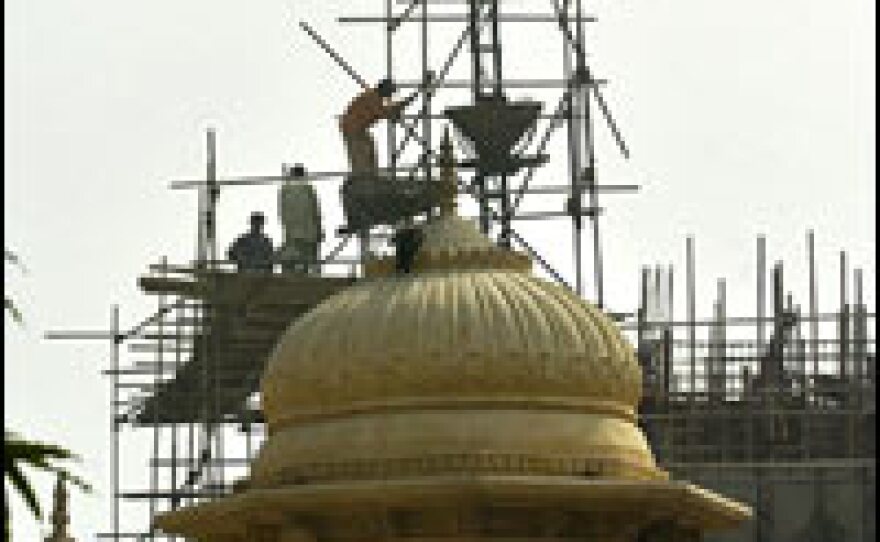
Morning Edition host Steve Inskeep is reporting from Karachi, Pakistan, for the beginning of a series called "The Urban Frontier," an occasional examination of the world's cities.
My reading material on the plane to Pakistan included two items of special interest. One was a little book titled The Economy of Cities, by the late Jane Jacobs.
The other was a promotional brochure put out by the government of the city for which I was bound:
"Karachi Calling! Explore the Heaven for Investment."
The heaven for investment?
You mean that city that usually makes headlines for a bombing or a murder? In that country whose currency has fallen even faster than the sad old American dollar?
Karachi has 15 million people, give or take a few million. As many as half live in squatter homes made of concrete blocks. The other day, I met some guys who slept in a thatch-roofed tent in the brickyard where they worked.
Karachi has also suffered from decades of political killings, including the day last December when a factory was burned with several people inside.
Still, it must be said that the city finally calmed down — enough that politicians are now killed less often than the electricity goes out.
Yes, that's what they mean by the heaven for investment.
Attracting Attention — and Money
Pakistan is straining to prove its largest city is worthy of the world's money. Officials are working to upgrade roads, bridges, and city services.
Some of the world is paying attention. A Malaysian firm is building a 47-floor office tower.
A company from Dubai just started digging foundation holes for a waterfront development planned to include more than 40 towers. Never mind that Pakistani officials haven't quite made it clear where they will get the electricity and water they have promised to supply.
The managing director of the waterfront development, an American named Steve McCartt, shrugs off the assorted risks of working in Pakistan. Karachi, he says, is starved for housing. So much has been built so badly for so long that he thinks upscale buyers will line up for California-style apartments and ocean views.
Inefficiency, a Good Thing
But if Karachi is ever going to grow into one of the world's great cities, the real reason may be found in that little book by Jane Jacobs.
Jacobs, a writer who became famous for her counterintuitive thinking, laid out a theory about cities.
In this 1969 work, Jacobs wrote that if a city is small, simple, efficient, and straightforward, its economic life is in danger. It may rely on a single big industry. It may stop inventing new products or lines of business. It may become a company town, doomed if the industry ever stumbles. (Among other examples, the book mentions Detroit).
In contrast, Jacobs says, there is an advantage to big, sloppy, disorganized, inefficient cities. They may have a million small industries, from factories to workshops to single people stitching clothes at home.
A man may work in a small business, making decorative buttons out of glass. He decides he can do better and starts his own workshop, blowing, say, glass vases, inventing new lines of trade and creating a little more wealth. Pretty soon his better assistants quit to form their own firm making something else again.
According to Jacobs, the problems of city life — the crowding, the pollution, the noise — continually create opportunities for anybody who can find a way to solve them.
Karachi residents have reason to hope that this theory holds true for them. Their city is too big for one industry to completely dominate — although Pakistan's military comes close. The city has the stock exchange, seaports, and endless industrial parks filled with factories and workshops. The buildings look like they're washed weekly in coal dust, but they churn out everything from pantyhose to cutlery.
And if Jacobs is right that urban problems are a natural resource, Karachi is sitting on one of the biggest opportunities in the world.
Copyright 2022 NPR. To see more, visit https://www.npr.org. 9(MDAzMjM2NDYzMDEyMzc1Njk5NjAxNzY3OQ001))







